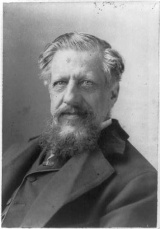Edwin Arnold
Sir Edwin Arnold, M.A., K.C.I.E., C.S.I.(June 10, 1832 – March 24, 1904) was an English poet and journalist, who is most known for his poetic life of Gautama Buddha, The Light of Asia.
Early life and career
Edwin Lester Arnold was born at Gravesend, Kent, on June 10, 1932, as the second son of a Sussex magistrate, Robert Coles Arnold. The young Arnold was educated at King's School, Rochester, King's College in London, and University College, Oxford. He won Oxford's Newdigate prize for poetry in 1852.
He became a schoolmaster, at King Edward's School, Birmingham for several years. In 1856 he accepted a post in India as Principal of the Government Sanskrit College at Poona and served there for seven years.
After returning to England, Arnold worked as a journalist at the Daily Telegraph, eventually becoming editor-in-chief of the Daily Telegraph during a forty-year career.
Association with Theosophists
Founding of Maha Bodhi Society
In 1885, Arnold published articles in The Telegraph drawing attention to the Buddha Gaya (Bodh Gaya) Temple, site of Gautama Buddha's enlightenment. The temple had been abandoned and was in deplorable condition. On January 22, 1891, the Anagarika Dharmapala, accompanied by Japanese priest Kozen Gunaratna, visited the site, and felt a tremendous urge to take action. On May 31, 1891, the Budh-Gaya Mahabodhi Society was formed, with Arnold as one of the founding members. The High Priest of Ceylon, H. Sumangala was President, Col. Olcott was Director and Chief Advisor, and Dharmapala was General Secretary. The new Society solicited contributions to maintain a staff at the Buddha Gaya site, and the Society convened an International Buddhist conference at the site in October, 1891. The temple complex was gradually restored, and the Maha Bodhi Society continues to be active in India and several other countries.
The Light of Asia
The most famous of Arnold's works is The Light of Asia, a book-length poem depicting the life of Gautama Buddha. Published in July, 1879 in London and also by two companies in New York, the book immediately caught the attention of Theosophists. A lengthy review was printed in the very first issue of The Theosophist, in October 1879. The book was praised by the reviewer, almost certainly Madame Blavatsky, for its literary qualities and for its treatment of the subject. The reviewer wrote, "if any Western poet has earned the right to grateful remembrance by Asiatic nations and is destined to live in their memory, it is the author of the "Light of Asia."[1]
Madame Blavatsky requested that each year on the anniversary of her death, her friends should gather and read from The Light of Asia and the Bhagavadgītā.[2] That tradition continues to this day among Theosophists around the world.
Numerous editions and translations have been produced since 1879, and the work is widely available in libraries worldwide.
Other writings
Son Julian as Theosophist
Sir Edwin's son Julian was active in the American Theosophical Society:
In a recent number of The Messenger, I [the editor, A. P. Warrington] mentioned a series of lectures which Mr. J. B. Lindon, one of our members residing in Chicago, had given at Besant Hall under the designation "Twilight Talks." These lectures were so successful and drew such large audiences that a program of a new series of historical lectures has been announced by the same lecturer, which by the time this issue reaches the mails will be well on the way.
Our members no doubt have learned from recent newspaper accounts that Mr. Lindon is none other than Mr. Julian B. Arnold, the son of the late Sir Edwin Arnold, the illustrious poet, scholar and interpreter of Indian ideals, whom Theosophists the world over have loved and revered for his immortal work.
When Mr. Julian B. Arnold came to America seven years ago he launched out in the chemical business, and for that and other reasons he adopted an old family name, so that he became known as J. B. Lindon. Owing to the encouragement which re received in his recent venture in the lecturing field, he has felt that he should no longer suppress his real identity.
I am sure that all Theosophists will join me in the hope that Mr. Arnold may some day become widely traveled as a lecturer throughout our country, where we hope he will always feel that he has a true home.[3]
Notes
- ↑ "'The Light of Asia' as Told in Verse by an Indian Buddhist,"The Theosophist 1.1 (October, 1879), 20-25.
- ↑ Sylvia Cranston, H. P. B.: The Extraordinary Life and Influence of Helena Blavatsky, (New York: Putnam, 1993), 429.
- ↑ Anonymous [A. P. Warrington, editor], "Sir Edwin Arnold's Son," The Messenger 2.12 (May, 1915), 510.
